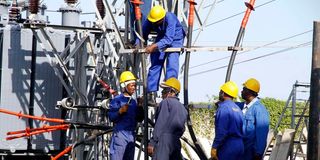Power purchase deals under forensic audit in push for more revenue

Kenya Power employees carry out repairs on transformers in Mombasa Town.The company said it would resume dividend payment “in the near future” should its performance continue to grow after bouncing back from losses.
Three firms are conducting forensic audits into the dealings at Kenya Power targeting different key departments including its procurement which has been variously put on the spot for irregular procurement deals.
Auditor-General Nancy Gathungu has revealed Kenya Power hired two consultants in February and a third in June to audit key functions that have been identified as the source of financial leakages that have plagued the utility for years.
“Two consultants were appointed in February 2022 and a third in June 2022 to carry out the assignment on behalf of the Auditor-General,” said Ms Gathungu.
The consultants are probing the power purchase agreements (PPAs) signed between Kenya Power and independent power producers (IPPs) that have loaded consumers with high power costs.
This came as Ms Gathungu noted Kenya Power pays an average of Sh3.93 per kilowatt-hour (kWh) for power purchased from KenGen compared to Sh11.87 per unit for that bought from IPPs.
Also Read: Senators plot to kill Kenya Power monopoly
Former President Uhuru Kenyatta made last-ditch attempts to renegotiate the PPAs in a bid to cut power costs but failed largely due to stiff resistance from powerful entities that own the IPPs.
The consultants are also tasked with probing the procurement and use of heavy fuel oil (HFO) used in electricity generation by thermal power plants over the last three years.
These agreements have been shrouded in secrecy amid accusations that they are used to load consumers with high fuel charge costs (FCC) way above market prices.
Further, they are also probing Kenya Power’s system losses arising from power theft and transmission system inefficiencies at a time the losses are way above the threshold allowed to be passed on to consumers.
Some 22.44 percent of the electricity purchased by the company from power generators valued at Sh31.2 billion was lost on the way leading to higher charges to consume.
Another key task for the consultants is to audit supply chain processes at the firm to improve efficiency and cut corruption in the key department.
Some 59 members of the department were sent home to pave way for a similar audit last year before they quietly resumed work this year.
“As of the date of this report, the forensic audits had not been finalized. Consequently, I was unable to perform alternative audit procedures and to quantify the adjustments, if any, likely to affect the revenue, cost of sales, administrative expenses, tax, property, plant and equipment, trade receivables, trade payables, and disclosures, in the absence of the forensic reports,” said Ms Gathungu.
This is as the company, which held its 101st annual general meeting (AGM) yesterday called for patience from shareholders who were demanding a dividend payment after a five-year drought.
The company said it would resume dividend payment “in the near future” should its performance continue to grow after bouncing back from losses.
“The last few years have seen us position the business on a firm growth trajectory through our focus on sales growth, improving revenue collection, reducing system losses, prudent cost management, and enhanced customer experience. We will sustain our focus on these areas as well as new emerging frontiers in order to propel the business to the next phase of its growth,” said Kenya Power’s acting Managing Director Geoffrey Muli.





